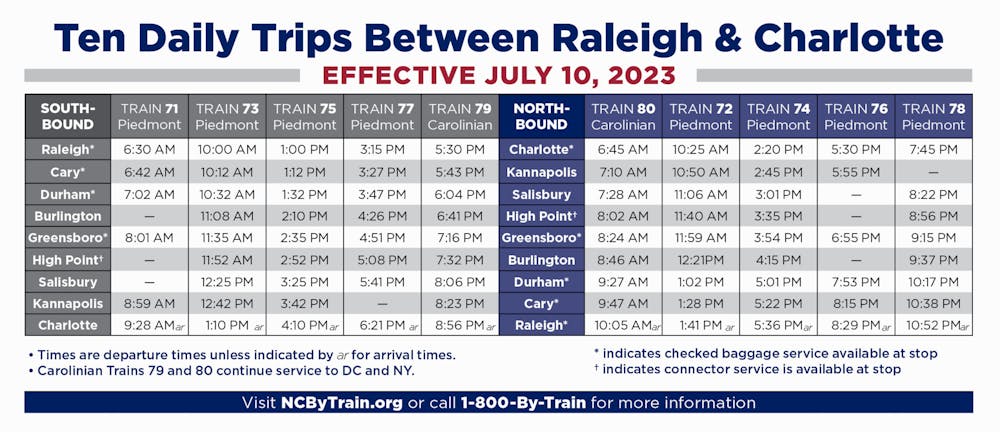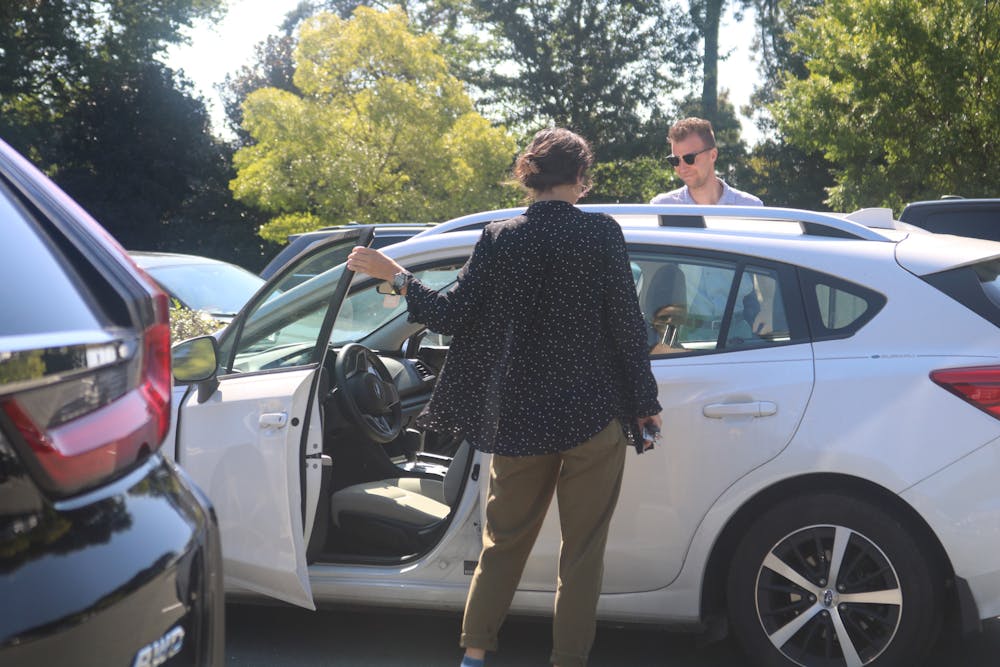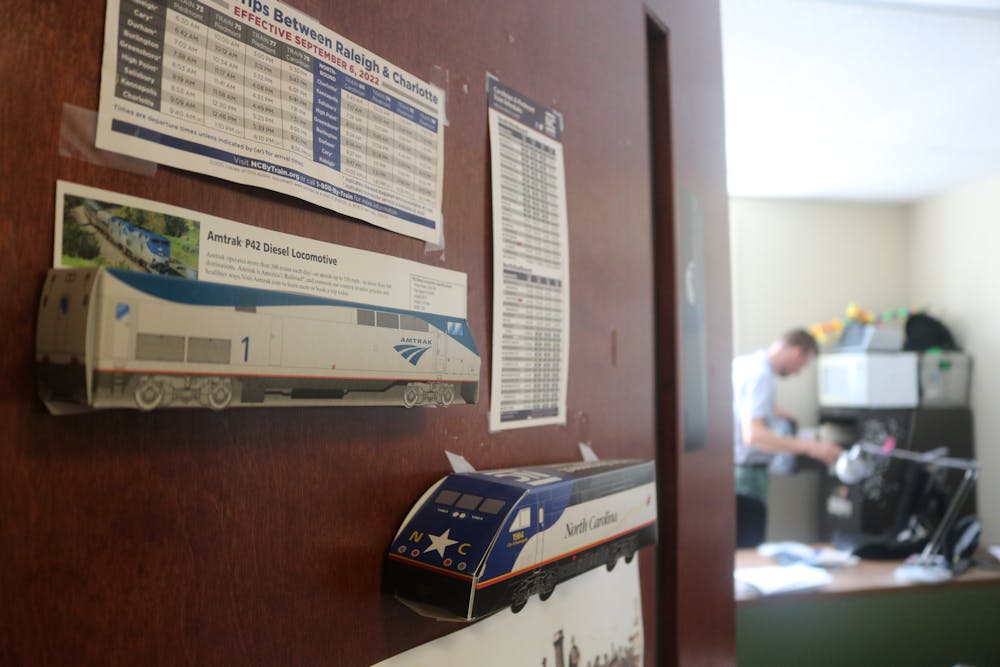It wasn’t until Elon University Human Service Studies professor Monica Burney tried to buy a train ticket over the summer for her usual train route that she discovered her stop no longer existed.
“I felt kind of confused at first and then just very, very frustrated,” Burney said. “It changed my whole plan for the week, and when you do have a family and you do have to factor in other people's schedules, then that matters.”
Burney enjoyed occasionally riding the train from Durham, where she lives and grew up, to work in Burlington. She said she also enjoys taking the train because it gives her a mental break from driving and helps the environment. Burney said she didn’t know anything about the upcoming changes to the schedule.
“It was just so ingrained in me that this was something that I would always be able to do,” Burney said. “So to have that kind of taken away from me, it really is like, ‘Wait, what's going on?’”
The North Carolina Department of Transportation changed the NC By Train daily schedule in July. NC By Train is the train service operated by the NCDOT, and Amtrak workers staff its trains.
Piedmont Train 71 and Train 76 have 10 daily routes in total. Now, two of the 10 routes no longer stop at the Burlington Station on North Main Street. This means the first opportunity for commuters to get off at the station is after 11 a.m., which is too late for some professors compared to 7:38 a.m. on the previous schedule.

Burney was one of many Elon faculty members disappointed by the lack of notice from NCDOT about the schedule changes. Assistant Dean for Career and Student Development at Elon Law Stacie Dooley said she learned about the schedule changes while riding the train one day through a conversation with a fellow rider.
“I was disappointed that they chose to remove the stops, rather than advertising them,” Dooley said. “If the ridership is low, tell more people about it. And I'm happy to be an ambassador for that.”
According to a statement released by NCDOT in June 2023, the NC Rail Division configured the new train schedule based on “equipment availability and use, train travel time and passing locations, ridership data and trends, and the time necessary to clean and prepare trains for the return trip at the end of routes.”
More than 500,000 people used the NC By Train service last year, which is higher ridership than the company has seen in over 30 years, according to NCDOT.
NCDOT Rail Division Director Jason Orthner attended a city of Burlington work session meeting Sept. 18 to answer questions from the council about the new schedule. City councilmember Kathy Hykes asked Orthner about the first daily train that no longer stops at Burlington station — which Elon University faculty would use to get to work.
“We've gotten a lot of calls when they couldn't get on that eight o'clock train from Durham to Elon University,” Hykes said. “So we're concerned about that.”
Orthner said NCDOT will continue to look at data, but based the decision on previous data showing “very little demand” for that early morning service. He said the rail division will consider additional schedule changes in about two years to allow them to observe new ridership trends.
Burlington Mayor Jim Butler said though he understood the “data-based decision,” he would like to see the community be more involved in future changes. Similar to local train riders, Butler said the town council did not know about the schedule changes ahead of time.
“It's not forever,” Butler said. “The key is to try to have good dialogue and not get combative, because if you get combative, then the data wins. If we have good dialogue, then maybe there can be some realistic emotional needs that we have that we want interjected into the conversation.”
Liz Macam, communications officer for NCDOT’s Rail and Integrated Mobility Divisions, said in a statement to Elon News Network that for future schedule changes and train additions, NCDOT is “committed to engaging with city staff, local officials and the public on informing on the schedule development and approval process by the railroads at the time it’s happening.”
For Political Science and Policy Studies professor Julianne Liebenguth, public transportation has always been reliable enough for her to go places. Before moving to Durham for her job at Elon University, she never owned a car.
“One of the major life changes I knew I would have to navigate was buying a car and driving every day,” Liebenguth said. “I thought that it was a worthy trade-off to be able to work at Elon, but it has really significantly changed my life and my lifestyle.”
A roundtrip ticket from Durham to Burlington costs $13. Liebenguth said owning a car has been a significant financial commitment and she wishes the early morning train route still stopped at Burlington station.
“I would definitely feel more connected to Elon as a place rather than having to commute by car, which kind of just makes me feel, again, isolated,” Liebenguth said.
Once a week, Liebenguth and Elon Philosophy professor Ryan Johnson ride to campus together from Durham. Johnson does not own a car and said when the train schedule changed in July, he was left to rely on carpooling with other professors or Ubering.

Johnson said he believes the committee's decision to use ridership statistics as a decision-making factor for the train schedule treats public transportation like a private service rather than a public service.
“While they're cutting this stuff because of alleged low ridership, they don't cut roads that are not used as much,” Johnson said. “Why not? Well, because they prioritize the car and don’t prioritize public transportation.”
Johnson began advocating for better public transit access for the Elon community in 2018. He hosted a meeting on campus with Elon University administration, sustainability groups and representatives from the NCDOT rail division. Since then, Johnson said the mission to improve public transportation has “gone backward.”
Beyond the return of the two Burlington station stops Liebenguth and Johnson said they would also like the train stop at Elon’s campus restored.
“I think that connecting Elon’s campus to the train would have so many positive things,” Johnson said. “It would match so many of the goals of sustainability: access, equity and connectivity.”


